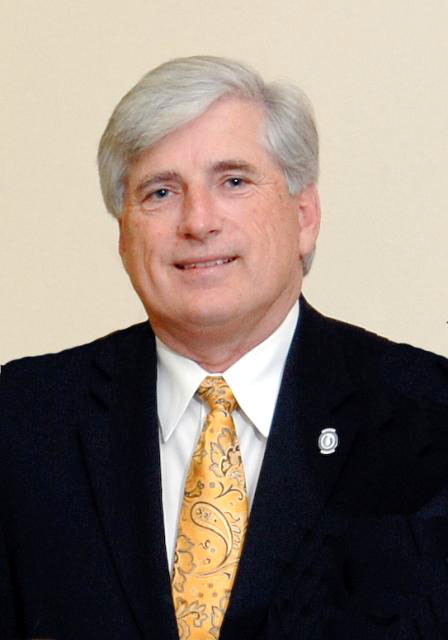UMMC professor, grad school dean, takes helm at American Physiological Society

When Dr. Joey Granger takes the helm of the American Physiological Society next week, he'll continue a tradition of leadership by University of Mississippi Medical Center scientists that's second only to Harvard University.
As president of the 10,500-member APS, Granger occupies a place in the rarified stratosphere of American science.
Granger, who takes office April 12 at the APS annual meeting in Washington,D.C., will be the organization's eighth president with a formal relationship to the Department of Physiology and Biophysics at UMMC and the second member of his immediate family to hold the office.
Only 229-year-old Harvard Medical School has had more alums as APS president than the University of Mississippi School of Medicine, which established its four-year program in 1955.
Physiology is the branch of biology that studies the workings - including chemical and physical processes - of living organisms and their components. The APS is a nonprofit that promotes education, scientific research and dissemination of information in the physiological sciences.
Granger follows the footsteps of the late Dr. Arthur C. Guyton, APS president 1974-75, who was the first chair of the UMMC Department of Physiology and Biophysics and one of the world's most preeminent cardiovascular physiologists.
Guyton is credited with finalizing the "sectionalization" of the society, which gave members the opportunity to meet in smaller groups with other members who shared their research interests. Today the society has 12 sections, six groups and oversees 14 scholarly journals.
Guyton, a Harvard-trained M.D., was the fork in the road leading to Mississippi ascendance in the organization. When he became president, he was the 17th of the 46 presidents who preceded him with a Harvard connection. Since Guyton, Mississippi has edged out the third-oldest medical school in the country. Only four presidents since Guyton have a Harvard connection.
In 1988, Dr. Aubrey Taylor, one of Guyton's graduate students, became APS president, followed the next year by Dr. Vernon Bishop, another of Guyton's students.
Dr. Allen Cowley, who did postgraduate work with Guyton and was on the physiology faculty here, became president in 1997, followed the next year by Dr. L. Gabriel Navar, another Guyton student.
Dr. John Hall, Granger's mentor when he was a graduate student in the department, was president in 2001. Hall is the current physiology and biophysics department chair at UMMC and studied with Guyton as a postdoctoral fellow before he joined the faculty in 1976.
Dr. Neil Granger, Joey's brother and a former graduate student in physiology at UMMC, was APS president in 2004.
Joey Granger is a Billy S. Guyton Distinguished Professor, professor of physiology, director of the Center for Excellence in Cardiovascular-Renal Research and dean of the University of Mississippi School of Graduate Studies in the Health Sciences.
In his presidency of APS, Granger plans to develop programs that improve the pipeline programs that help flow more U.S. high school and undergraduate students into physiology graduate programs.
"Fewer and fewer students are choosing physiology," he said. "There aren't many physiology courses on the undergraduate level, so most students are unfamiliar with it, and it is different from other biological sciences. It's more conceptual, integrative and quantitative."
Granger says the department has always encouraged its faculty's active participation in APS activities. Both Hall and Granger have been chairs of the APS Water and Electrolyte Section, now chaired by Dr. Jane Reckelhoff, UMMC professor of physiology. Dr. Robert Hester, professor of physiology, chairs the cardiovascular section.
It's not just the Mississippi connection that qualifies a scientist to lead the 124-year-old organization. All the presidents have been noted physiologists with an impressive record of original research and scholarly publications. Granger, Hall, Guyton and the five other UMMC-trained physiologists have all made significant contributions to the body of knowledge in their areas of interests.
Granger, a graduate of the University of Louisiana at Lafayette, earned his Ph.D. at the University of Mississippi Medical Center, then completed a postdoctoral research fellowship at Mayo Medical School. He was on the faculty at Mayo and at Eastern Virginia Medical School before joining the UMMC faculty in 1990.
He has received several APS awards, including the 2008 E. H. Starling Distinguished Lecture Award, the 2008 Bodil M. Schmidt-Nielsen Distinguished Mentor and Scientist Award, the Harold Lamport Award of the Cardiovascular Section and a Young Investigator Award, and he was invited to give both the Bowditch Lecture for the APS and the Dahl Memorial Lecture for the American Heart Association.
He is associate editor of the journal, Hypertension, and serves as editor of the e-book series Integrative Systems Physiology. He also has served in editorial posts for a number of prestigious physiology journals. He is currently on the leadership committee of the Council for High Blood Pressure Research of the American Heart Association, and has frequently served on study sections for the American Heart Association, the National Institutes of Health, NASA and the Veterans Administration. He currently serves as chair of the NIH hypertension and microcirculation study section.
His research on the role of kidneys in hypertension, factors in mediating pregnancy-induced hypertension, and the role of the renal endothelin system in salt-sensitive hypertension has been continuously funded by the NIH since 1984.


